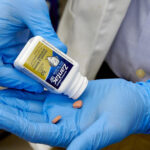Food makers must alert government officials of potentially contaminated products within 24 hours under a new rule designed to help federal regulators spot food safety problems sooner.
The Food and Drug Administration displayed a new electronic database where manufacturers must notify the government if they believe one of their products is likely to cause sickness or death in people or animals.
Regulators said the database will help the FDA prevent widespread illness from contaminated products and direct inspectors to plants that pose a high safety concern.
“There’s been a lag time; we learn about problems after people get sick,” said Michael Taylor, senior adviser to the FDA’s commissioner. “This is intended to inform us of contamination problems before people get sick.”
The law creating the database was passed in 2007, after Congress criticized the FDA for its handling of safety problems with a range of foods and drugs, many of them imported.
The FDA has struggled since then to manage a spate of food-safety recalls, including national outbreaks of salmonella linked to peppers and peanut butter. President Barack Obama pledged this year to improve the safety of the U.S. food supply, after tainted peanut butter from a Georgia plant sickened hundreds of Americans and caused one of the largest food recalls in recent history.
“Working with the food industry, we can swiftly remove contaminated products from commerce and keep them out of consumers’ hands,” Taylor told reporters. Many companies already voluntarily submitted reports about possible contamination, but the new law “makes this a duty that all food facilities have,” he said.
The food industry welcomed the new database, but the FDA must answer a number of questions about how it will work, according to a spokesman for the Grocery Manufacturers Association. Its members include ConAgra Foods Inc., Kraft Foods Inc. and Nestle USA Inc.
“As with any new system … there are bound to be a number of issues to be resolved in the initial stages, and we would hope that the agencies will take this into account,” said spokesman Scott Openshaw.
The new reporting requirements apply to all U.S. facilities that are registered with the FDA to process, pack or hold food, with the exception of infant formula and dietary supplement makers, which have separate reporting requirements.
Was this article valuable?
Here are more articles you may enjoy.

 Report: Claims Handlers Embracing Technology
Report: Claims Handlers Embracing Technology  UnitedHealth Data Leak May Affect ‘Substantial’ Swath of U.S.
UnitedHealth Data Leak May Affect ‘Substantial’ Swath of U.S.  Sanofi to Pay $100 Million to Settle Zantac Cancer Lawsuits
Sanofi to Pay $100 Million to Settle Zantac Cancer Lawsuits  DraftKings Sued Over ‘Risk-Free’ Bets That Were Anything But
DraftKings Sued Over ‘Risk-Free’ Bets That Were Anything But 